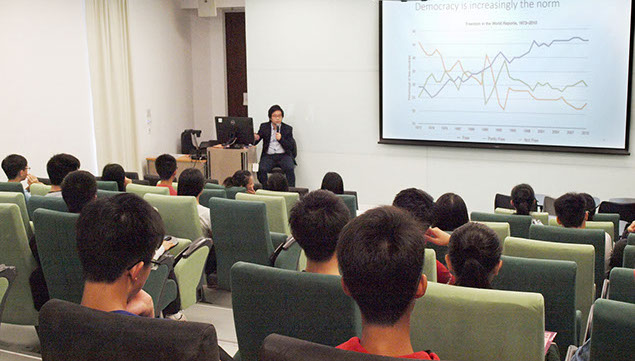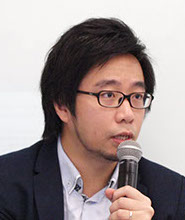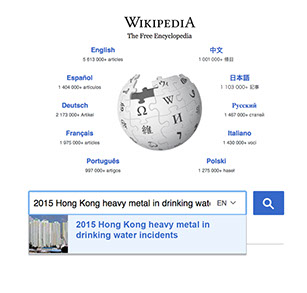_01.png?crc=4174553115)
Cover Story
Research
People
Books
Archive
Download PDF
Download PDF
E-book version
Teaching
and Learning
Knowledge
Exchange
The Umbrella Movement of 2014 attracted intense media attention from around the world and in so doing, also created a challenge for teachers of Hong Kong politics. More and more foreign exchange students started to enrol in their courses, but they struggled to keep up with their local counterparts, many of whom had participated in the movement. The foreign students were mostly unaware of the factions and divisions of local politics, could not follow developments in the local Chinese media, and some did not know that Hong Kong was a British colony until 1997.
“There was a huge imbalance in prior knowledge about Hong Kong,” said Dr Mathew Wong who teaches the third-year course ‘Hong Kong Politics’, which has no prerequisites. “I realised that I needed to do something to address this situation so I could teach to such a diversified profile of students.”
He applied for and received a Teaching Development Grant (TDG) in which he asked a question fundamental not just to his course, but any locally-focussed course at HKU and, indeed, in any university. “We talk about internationalisation as an important part of the University’s mission, but how do you teach a local course in the age of globalisation?” he said.
To find answers, he started by surveying political science courses at top universities around the world, where he found a mix of approaches. American universities, for example, tended to have many courses focussed exclusively on their country, while European universities focussed on comparative offerings.
“At Cambridge University they don’t have an outright course on British politics. It is grouped under a module on European politics. This was very interesting because they have put in these international comparative perspectives but perhaps sacrificed domestic content,” he said.
Keeping a balance
The lesson he drew from this was that it might be possible to combine both approaches. Local content could and should be relevant – as in the American universities – but comparative perspectives like the European universities had done could make the content more globally relatable.
“Even though foreign students might not know that much about Hong Kong, they can still apply theories they may have previously learned to Hong Kong politics. This could also benefit local students by helping them understand how the situation of Hong Kong can relate to politics in other democracies,” he said.
Dr Wong realised that foreign and non-local students also needed access to more information – in particular, Chinese-language content. With the TDG, he arranged for translations of news and commentary articles from the Chinese media. He focussed on one key event per year since 1997 and posted this on a website that is accessible to all.
The change in approach and the new materials were introduced in 2016 and enrolment of both exchange and non-local students subsequently more than doubled to about 20 of the 120 students taking his course – a ratio that is similar to enrolments in other courses offered by his department that do not focus on Hong Kong.
“My project is a small one, but I hope it has made the learning experience better for both foreign students and local students,” he added.

LOCAL POLITICS MADE GLOBALLY RELEVANT
In his ‘Hong Kong Politics’ course, Dr Mathew Wong faced a dilemma increasingly common among internationalised universities. His local students were deeply familiar with the local situation, but foreign exchange students were not – some did not even know Hong Kong was once a British colony. So he set out to bridge the gap.

![]() We talk about internationalisation as an important part of the University’s mission, but how do you teach a local course in the age of globalisation?
We talk about internationalisation as an important part of the University’s mission, but how do you teach a local course in the age of globalisation? ![]()
Dr Mathew Wong
Back
“Wikipedia is a valuable public resource, but it has relatively few entries on Hong Kong and many of the existing articles need updating. Given this state of affairs, I thought it would be a meaningful way for students to improve the Wikipedia knowledge base about public administration in Hong Kong,” he said.
In the 2017–2018 academic year, the students contributed entries to 22 pages on such topics as the Office of the Ombudsman and the detection of heavy metals in drinking water in 2015. Dr Chan said he hoped the project will continue (he is on sabbatical next year) so that the knowledge base about Hong Kong can be kept as up to date as possible.
The Wikipedia project
Wikipedia’s pages on Hong Kong Government and politics are often incomplete or out-of-date. Now, through the efforts of Dr Kwan-nok Chan’s third-year students, they are getting a breath of life.
Dr Chan requires students of his ‘Public Administration in Hong Kong’ course to do a Wiki page project for assessment. The idea is that they translate what they have learned in class into a format accessible to the public and upload that to Wikipedia.

_12.png?crc=3983972701)